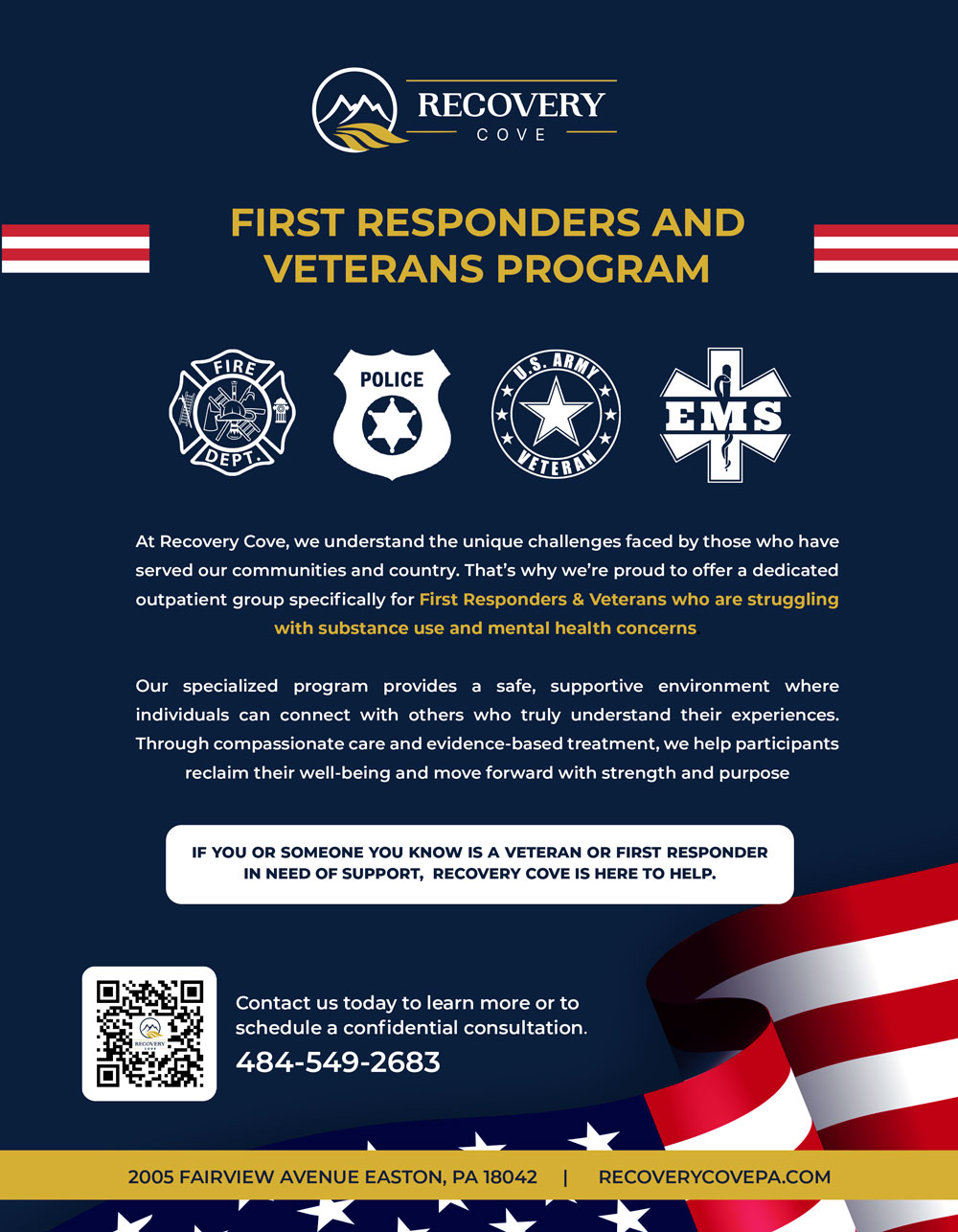
The majority of Americans ages 18 and up have drunk alcohol at some point in their lifetime. Alcohol is legal, accessible and socially acceptable, often giving the illusion that it’s a “safe” substance. While it’s usually fine to have a drink on occasion, doing so can start some individuals on a path to alcohol misuse. Misusing alcohol can increase the risk of developing alcohol use disorder (AUD), which will then require some level of alcohol treatment in Easton PA. This could include an inpatient or outpatient program, as well as behavioral therapies, counseling, medication and 12-step meetings.
Recovery Cove in Easton, PA offers alcohol treatment in a convenient outpatient setting. This means that you get to return home and sleep in your own bed at night! This can be especially beneficial for those who work, go to school or have families at home. Our quality of care is just as effective as what you would receive in an inpatient program, and you will also have access to a range of holistic therapies to support a full recovery, such as yoga, meditation, mindfulness and art therapy. Because alcohol is in our everyday lives, we know how important it is to have healthy hobbies and activities to turn your attention toward.
Let’s learn more about AUD, how to know when it’s time for professional support and the treatment options available.
What is Alcohol Use Disorder?
Alcohol use disorder is a medical condition that makes it difficult to stop or control your drinking despite negative consequences. AUD, which includes alcohol abuse, alcohol dependence, alcohol addiction and alcoholism, can be mild, moderate or severe. You do not need to wait to seek support until your condition worsens. You can get help early on and avoid the negative effects of severe AUD, which can include liver disease, cognitive changes, heart problems, decreased immunity, job loss, legal issues and damaged relationships.
Your risk of developing AUD depends on many factors, including how often, how much and how quickly you drink alcohol. Alcohol misuse, such as binge drinking, can also increase the risk for AUD over time. Other factors that impact your risk of AUD are:
- Drinking at an early age. The younger you are when you start drinking, the more likely you are to become dependent on the substance. One study found that people who started drinking before age 15 were more than three times as likely to have AUD compared to those who waited until they were 21.
- Your genetics also play a role in AUD. In fact, they account for about 50-60 percent of your risk. If you have close family members, such as a parent or sibling, with AUD, your risk is higher as well. It’s also likely that growing up in a household where alcohol is present can also influence your choices regarding alcohol.
- Mental health conditions. Having a mental health disorder like anxiety or depression can raise the risk for AUD, as you may turn toward alcohol to ease your symptoms. A history of trauma is also a risk factor as alcohol can be used as an escape from your symptoms.
What are the Symptoms of Alcohol Use Disorder?

When diagnosing AUD, health professionals use criteria from the DSM-5. This criteria not only diagnoses AUD but can also help doctors determine the severity of the condition. Meeting 2-3 criteria means you have mild AUD, 4-5 criteria means you have moderate AUD and 6 or more means you have severe AUD. No matter how severe your problem may seem, alcohol treatment in Easton PA can help.
Here are the criteria used to diagnose AUD:
- Drinking more or longer than intended
- Wanting to cut down or quit but can’t
- Spending a lot of time drinking or recovering from hangovers
- Strong desire to drink—unable to think of anything else
- Alcohol is interfering with your responsibilities
- Experiencing depression, anxiety or blackouts from drinking
- Continuing to drink despite negative consequences
- Giving up other activities to leave more room for alcohol
- Getting yourself into dangerous situations due to your drinking (driving under the influence, domestic violence, unsafe intercourse)
- Having to drink more to get the same effects as you used to
- Experiencing withdrawal symptoms when you haven’t had a drink
What Treatments are Effective for AUD?
No matter what symptoms you are experiencing, treatment for AUD is effective and can help you overcome this disorder. Each person is different, so there is no set treatment for everyone. Your treatment plan will address your unique needs and include a combination of the following:
Medications
Medications can be used during the withdrawal period to ease withdrawal symptoms and reduce cravings. Three medications have been approved by the FDA to help stop drinking: naltrexone, acamprosate and disulfiram. Other medications may be used as well to help with nausea, anxiety, depression or insomnia.
While medications can help you reduce your alcohol intake, the gold standard is a combination of both medications and behavioral therapies. Talking with a therapist can help you understand your motivations for drinking alcohol and healthier ways to cope. Mutual-support groups are also effective for stopping or reducing drinking as they provide peer support and guidance. These groups are available in most communities for free or low-cost.
It’s important to know that recovering from AUD is a lifelong journey that may involve setbacks. Seeking professional help is the best way to overcome AUD and continue learning skills to overcome your triggers and avoid alcohol.
Where to Find Alcohol Treatment in Easton PA
Recovery Cove offers treatment services for mild, moderate and severe AUD. We treat the whole individual as we recognize that the mind, body and spirit need to be in alignment. One cannot remain healthy if the others are hurting. We provide a caring, compassionate and non-judgmental space for individuals to work through their problems and build healthy, honest lives. Once you complete our program, we also continue providing support through our aftercare services. To learn more about our treatment options for AUD, contact Recovery Cove at 484-549-COVE.









